2018/July New 70-761 Exam Dumps with PDF and VCE Free Updated Today! Following are some new 70-761 Real Exam Questions:
1.|2018 Latest 70-761 Exam Dumps (PDF & VCE) 171Q&As Download:
https://www.braindump2go.com/70-761.html
2.|2018 Latest 70-761 Exam Questions & Answers Download:
https://drive.google.com/drive/folders/0B75b5xYLjSSNZG9yTW9reVdkZG8?usp=sharing
QUESTION 147
Note: This question is part of a series of questions that present the same scenario. Each question in the series contains a unique solution that might meet the stated goals. Some question sets might have more than one correct solution, while others might not have a correct solution.
After you answer a question in this section. You will NOT be able to return to it. As a result, these questions will not appear in the review screen.
You have a table named Products that stores information about products your company sells. The table has a column named ListPrice that stores retail pricing information for products.
Some products are used only internally by the company. Records for these products are maintained in the Products table for inventory purposes. The price for each of these products is $0.00. Customers are not permitted to order these products.
You need to increase the list price for products that cost less than $100 by 10 percent. You must only increase pricing for products that customers are permitted to order.
Solution: You run the following Transact-SQL statement:
Does the solution meet the goal?
A. Yes
B. No
Answer: B
QUESTION 148
You have a database named DB1 that contains a temporal table named Sales.Customers.
You need to create a query that returns the credit limit that was available to each customer in DB1 at the beginning of 2017.
Which query should you execute?
A. 
B. 
C. 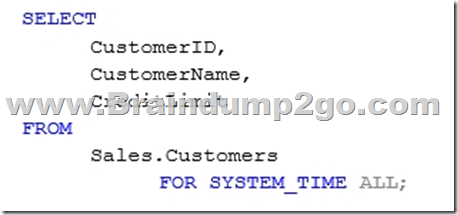
D. 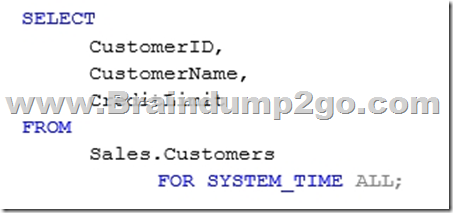
Answer: B
QUESTION 149
Note: This question is part of a series of questions that use the same or similar answer choices. An answer choice may be correct for more than one question in the series. Each question is independent of the other questions in this series. Information and details provided in a question apply only to that question.
You have a database that contains several connected tables. The tables contain sales data for customers in the United States only.
You need to create a query that generates sample data for a sales table in the database.
The query must include every product in the inventory for each customer.
Which statement clause should you use?
A. GROUP BY
B. MERGE
C. GROUP BY ROLLUP
D. LEFT JOIN
E. GROUP BY CUBE
F. CROSS JOIN
G. PIVOT
H. UNPIVOT
Answer: C
Explanation:
https://docs.microsoft.com/en-us/sql/t-sql/queries/select-group-by-transact-sql?view=sql-server-2017
QUESTION 150
Note: This question is part of a series of questions that use the same or similar answer choices. An answer choice may be correct for more than one question in the series. Each question is independent of the other questions in this series. Information and details provided in a question apply only to that question.
You have a database that contains several connected tables. The tables contain sales data for customers in the United States only.
All the sales data is stored in a table named table1. You have a table named table2 that contains city names.
You need to create a query that lists only the cities that have no sales.
Which statement clause should you add to the query?
A. GROUP BY
B. MERGE
C. GROUP BY ROLLUP
D. LEFT JOIN
E. GROUP BY CUBE
F. CROSS JOIN
G. PIVOT
H. UNPIVOT
Answer: D
Explanation:
https://docs.microsoft.com/en-us/sql/t-sql/queries/from-transact-sql?view=sql-server-2017
QUESTION 151
Note: This question is part of a series of questions that use the same or similar answer choices. An answer choice may be correct for more than one question in the series. Each question is independent of the other questions in this series. Information and details provided in a question apply only to that question.
You have a database that contains several connected tables. The tables contain sales data for customers in the United States only.
You have the following partial query for the database. (Line numbers are included for reference only.)
You need to complete the query to generate the output shown in the following table.
Which statement clause should you add at line 3?
A. GROUP BY
B. MERGE
C. GROUP BY ROLLUP
D. LEFT JOIN
E. GROUP BY CUBE
F. CROSS JOIN
G. PIVOT
H. UNPIVOT
Answer: A
QUESTION 152
Note: This question is part of a series of questions that use the same scenario. For your convenience, the scenario is repeated in each question. Each question presents a different goal and answer choices, but the text of the scenario is exactly the same in each question in this series.
You query a database that includes two tables: Project and Task. The Project table includes the following columns:
The Task table includes the following columns:
You plan to run the following query to update tasks that are not yet started:
UPDATE Task SET StartTime = GETDATE() WHERE StartTime IS NULL
You need to return the total count of tasks that are impacted by this UPDATE operation, but are not associated with a project.
What set of Transact-SQL statements should you run?
A. 
B. 
C. 
D. 
Answer: B
QUESTION 153
You have a database named DB1 that contains a temporal table named Sales.Customers.
You need to create a query that returns the credit limit that was available to each customer in DB1 at the beginning of 2017.
Which query should you execute?
A. 
B. 
C. 
D. 
Answer: B
QUESTION 154
Note: This question is part of a series of questions that use the same or similar answer choices. An answer choice may be correct for more than one question in the series. Each question is independent of the other questions in this series. Information and details provided in a question apply only to that question.
You create a table by running the following Transact-SQL statement: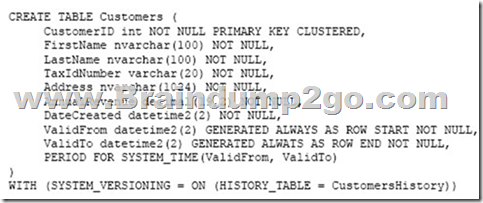
You are developing a report that aggregates customer data only for the year 2014. The report requires that the data be denormalized.
You need to return the data for the report.
Which Transact-SQL statement should you run?
A. 
B. 
C. 
D. 
E. 
F. 
G. 
H. 
Answer: G
QUESTION 155
Note: This question is part of a series of questions that use the same or similar answer choices. An answer choice may be correct for more than one question in the series. Each question is independent of the other questions in this series. Information and details provided in a question apply only to that question.
You create a table by running the following Transact-SQL statement: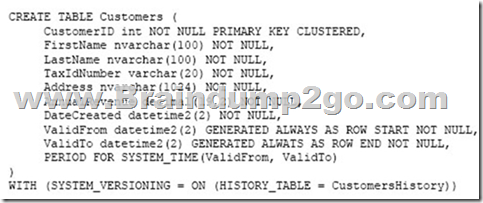
You need to return normalized data for all customers that were added in the year 2014.
Which Transact-SQL statement should you run?
A. 
B. 
C. 
D. 
E. 
F. 
G. 
H. 
Answer: G
QUESTION 156
Note: This question is part of a series of questions that use the same or similar answer choices. An answer choice may be correct for more than one question in the series. Each question is independent of the other questions in this series. Information and details provided in a question apply only to that question.
You run the following Transact-SQL statement: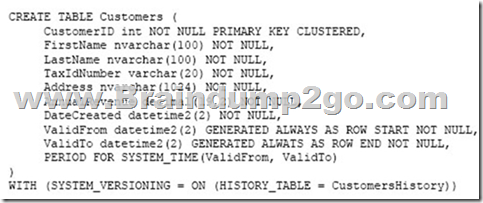
You need to return the total annual revenue for all customers, followed by a row for each customer that shows the customer’s name and annual revenue.
Which Transact-SQL statement should you run?
A. 
B. 
C. 
D. 
E. 
F. 
G. 
H. 
Answer: A
QUESTION 157
Note: This question is part of a series of questions that use the same or similar answer choices. An answer choice may be correct for more than one question in the series. Each question is independent of the other questions in this series. Information and details provided in a question apply only to that question.
You create a table by running the following Transact-SQL statement: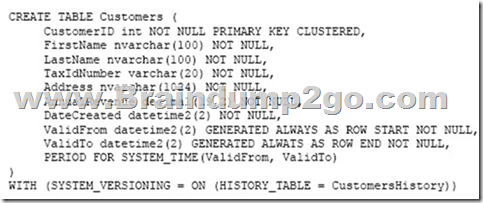
You need to develop a query that meets the following requirements:
– Output data by using a tree-like structure.
– Allow mixed content types.
– Use custom metadata attributes.
Which Transact-SQL statement should you run?
A. 
B. 
C. 
D. 
E. 
F. 
G. 
H. 
Answer: F
!!!RECOMMEND!!!
1.|2018 Latest 70-761 Exam Dumps (PDF & VCE) 171Q&As Download:
https://www.braindump2go.com/70-761.html
2.|2018 Latest 70-761 Study Guide Video: